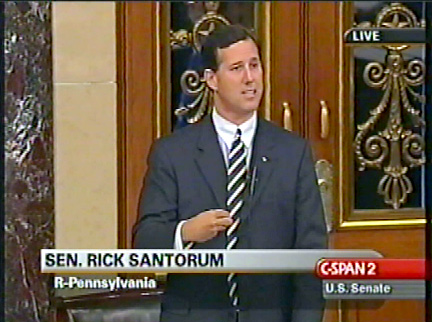
WASHINGTON (BP)–The Federal Marriage Amendment was defeated in the Senate on a procedural vote July 14, but its supporters said the debate on the issue is far from over.
The amendment itself did not make it to a vote. Needing 60 votes to limit debate and allow a vote — a procedure called invoking cloture — amendment supporters received only 48 votes. Fifty senators voted against cloture, in essence blocking a vote.
“The battle has just begun,” the amendment’s sponsor, Sen. Wayne Allard, R.-Colo., said after the vote. “I think this is a very strong first vote. [T]his is a long process. Nobody on our side, I think, ever felt for a minute that this was going to be a one-shot deal.”
Allard said he would “sit down with colleagues” and “work toward a consensus.” But he said that because of the Senate’s tight schedule, a vote is unlikely for the rest of the year. A vote in the House is expected to take place before the November election.
“[W]e’ll have more votes in the following years,” Allard said.
President Bush, who supports the amendment, expressed disappointment but urged the House to pass the amendment.
“I am deeply disappointed that the effort to pass a constitutional amendment affirming the sanctity of marriage as being between a man and a woman was temporarily blocked in the Senate,” he said in a statement. “Activist judges and local officials in some parts of the country are not letting up in their efforts to redefine marriage for the rest of America — and neither should defenders of traditional marriage flag in their efforts.”
Sen. Sam Brownback, R.-Kan., said his office received more phone calls on the amendment in a five-day period than it has on any other issue in the same timeframe since he entered the Senate. He supports the amendment.
“The great debate is engaged,” he said. “I think we are going to have a long, extended discussion in this country [about the definition of marriage].”
Brownback said amendment supporters “won on substance but lost on procedure.”
Even if the amendment had made it to a vote, it likely would have fallen short of the 67 votes needed to pass. Six Republicans voted to prevent a vote on the amendment, led by four GOP senators from the New England states. Even Republican John Warner of Virginia, who voted to allow a vote, said he was uncomfortable with the second sentence of the amendment.
The second sentence, amendment supporters say, would prevent courts from legalizing Vermont-type civil unions but would allow state legislatures to do so. The sentence in dispute reads, “Neither this Constitution, nor the constitution of any State, shall be construed to require that marriage or the legal incidents thereof be conferred upon any union other than the union of a man and a woman.”
Sen. Gordon Smith, R.-Ore., supported striking that sentence and passing only a one-sentence amendment that reads, “Marriage in the United States shall consist only of the union of a man and a woman.” Although that amendment never was considered, it likely would have received more support.
“I’m advised that it would garner perhaps as many as 10 new votes,” Sen. John Cornyn, R.-Texas, said on the floor.
Ironically, support for an amendment could grow if courts continue to issue rulings siding with same-sex “marriage.” Opponents of the amendment repeatedly said during debate that the Defense of Marriage Act, signed into law in 1996, is adequate to protect marriage. That law prevents the federal government from legalizing same-sex “marriage” and gives states the option to do the same.
Sen. Joseph Lieberman, D.-Conn. — an amendment opponent — said that if DOMA is declared unconstitutional, “there will be enough time for those of us who oppose [same-sex] marriage to act statutorily or constitutionally.”
Another amendment opponent, Sen. Tom Carper, D.-Del., made a similar comment. He noted that when he was governor of Delaware he signed a law banning same-sex “marriage.”
“Time will tell, but I believe that my law in Delaware will also be sustained without a constitutional amendment, and if it isn’t, then this is an issue that we can revisit and I think will,” Carper said.
Amendment opponents asserted that the issue should be left to the states.
“This fundamental responsibility lies with the states,” Minority Leader Tom Daschle, D.-S.D., said during debate. “It has for two centuries.”
Supporters of the amendment, though, said that courts were preventing it from being a states rights issue.
“The question is no longer whether the Constitution will be amended,” Majority Leader Bill Frist, R.-Tenn., said. “The only question is who will amend it and how it will be amended. Will activist judges — not elected by the American people — destroy the institution of marriage? Or will the people protect marriage as the best way to raise children? My vote is with the people.”
Sen. Patrick Leahy, D.-Vt., said the amendment would “write discrimination” into the Constitution.
“Gay and lesbian Americans across the nation are looking to the Senate today to see whether this body is going to brand them as inferiors in our society,” Leahy said.
One amendment supporter, Sen. Rick Santorum, R.-Pa., said those arguing for states rights were instead arguing for state courts to do the “dirty work.” Mocking that argument, Santorum said, “America, look somewhere else. Don’t pay attention to what’s going on here. Everything will be fine. Just leave to us — us judges.”
The issue, Santorum said, is worth debating.
“I would argue that the future of our country hangs in the balance because the future of the American family hangs in the balance,” he said.
Three Democrats voted to allow a vote: Robert Byrd (W.Va.), Zell Miller (Ga.) and Ben Nelson (Neb.).
Six Republicans voted to block a vote: Ben Nighthorse Campbell (Colo.), Lincoln Chafee (R.I.), Susan Collins (Maine), John McCain (Ariz.), Olympia Snowe (Maine) and John Sununu (N.H.).
Democratic Sens. John Kerry and John Edwards were campaigning and did not vote.
Constitutional amendments require the passage of two-thirds of both the House and Senate and ratification by three-fourths of the states.
–30–
For more information about the national debate over same-sex “marriage,” visit
https://www.bpnews.net/samesexmarriage















